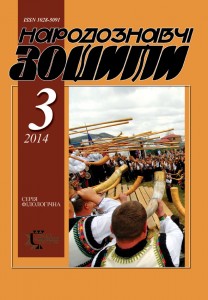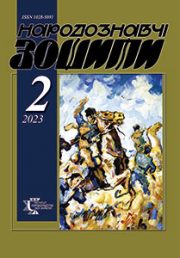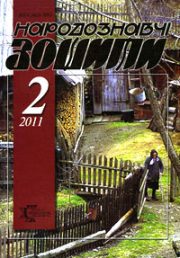
Yevhen Nakhlik. On historicity and psychologism of shevchenko’s realism. P. 431-452
In the synthetic article have been generalized and in new way considered various aspects of realism in T. Shevchenko’s poetry and prose. A statement is being proven that Shevchenko’s lyrical autopsychography had strived not to realism only, but to historicity as well — and moreover — even in greater measure than Romantic historical poems — in the sense of true, concrete historical reflection of poets life and psychological history, an exemplification of creative personality from the mid-XIX c.
Keywords: mimetism, social and psychological analysis, socio-historical concreteness, socio-psychological determinism, criticism of social reality, satire, grotesque realism, enlightenment realism, literature typification.
read »
Vasyl Pakharenko. «Shall share one’s own heart…» (Family archetypes in taras shevchenko’s artistic world). P. 453-461
In the article have been forwarded reasons for a notion that Shevchenko’s visionary and myth-creating type of gift quite naturally determined grounding archetypality featuring the poet’ creative work. Family archetype, defined by Kobzar has been exposed on the levels of personality, nationality and spitituality.
Keywords: Taras Shevchenko, archetype, myth-creativity, visionarism, Christology, national mentality.
read »
Roman Kyrchiv. «So make the handshake to a cossack and bring your honest heart as gift». P. 462-466
The article has presented a kind of spiritual connection, an echo of ideal concept expressed by Shevchenko’s verse To Poles in the present-day Polish song performed under strong impression of Kyivan Euromaidan, — Podaj rękę Ukrainie (Give hand to Ukraine)
Keywords: concept, heart, reflection, metaphorical contents
read »
Oksana Kuzmenko. On ideal concepts by T. Shevchenko in poetics of riflemen’s folklore (Ukraine, Glory, Freedom, Tomb). P. 467-477
In the article have been considered poetical images of Ukraine, Glory, Freedom and Tomb widely used in artistic system of Riflemen’s folklore (people’s and folklorized songs, tales etc. particularly); these notions have been compared to the-same-named Shevchenko-coined ideal categories with great correlation in meanings of both data groups. Statement has been forwarded, that Shevchenko’s natiosophical conception made direct influence upon the contents, semantic structure and pragmatics of mentioned imagery and its constants.
Keywords: T. Shevchenko, Riflemen’s folklore, Ukraine, glory, freedom, open tomb, poetics, concept, image.
read »
Valentyna Kravchenko. hryhorii nudha as T. Shevchenko scholar. P. 478-480
In article has been presented the research profile of H. Nudha in his efforts to conceive quite deepened essence of T. Shevchenko’ poetry as well as that of Ukrainian Romantic ballads in their historical development. Analytical study of T. Shevchenko’s ballad «Why do you go to the grave?..» has been performed accordingly to prescriptive directions traced by H. Nudha.
Keywords: Hryhorii Nudha, Shevchenko studies, ballads, content, poetics.
read »
Oleksii Vertii. Hryhorii Nudha’s ethics. P. 481-490
The article has identified main sources and components of H.A. Nudha’s ethics as a citizen, a scholar and a writer.
Keywords: life, purpose, meaning, value, world-view, position.
read »
Ludmyla Mykhno. On some features of H.A. Nudha’s scientific language and thinking. P. 491-493
In the article have been considered certain specific characteristics by H.A. Nudha’s stylistic manner as for his scientific works (linguistic aspect). An attempt has been made to distinguish main stylistic dominants of scholar’s scientific discourse.
Keywords: scientific style, language of scientific works, scientific discourse.
read »
Roman Holyk. On tears and bone: World War i in Galician peasants’ texts and imagery. P. 494-501
Some aspects of folklore imagery as for the World War I and its reception by Galician peasants’ historical consciousness have been put under study in the article. The author has presented analytical research-work in the songs of the so-called «Thalerhof cycle» in comparison with people’s other texts on war events.
Keywords: Galicia, history, Thalerhof, folklore, World War I, peasants, mental notions.
read »
Yevhen Lunyo. The insurrectional epic tradition in the modern development of statehood. P. 502-513
The role and the place of insurrectional epic tradition under conditions of present-day realities of Ukrainian State have been considered in article. Indication has been made that narrative folklore of heroic OUN and UPA period still delivers important ideas and postulates to newer generations: as idealism, nationalism, civilization choice, statehood, sovereignty, unity, consolidation, self-reliance, language issue, democracy in its true sense as well as similar qualities necessary for successful establishment of statehood.
Keywords: state building, rebel epic tradition, OUN, UPA, mass consciousness, heroism, national spirit.
read »
Olha Kharchyshyn. Malanka songs by Ukrainians of Northern Moldova: poetic aspect (reinterpretation of motives). P. 514-528
On the basis of materials got in the course of expeditions through Ukrainian villages of Northern Moldova (2005—2009) we have traced several functional shifts appeared at XX—XXI cc. in Malanka New Year songs and reinterpretation of poetic motives. We have found quite distinct pre-marital semantic features in recorded songs, and thus the latter phenomena of regional creativeness might be considered in the general system of Ukrainian folk love poetry
Keywords: Malanka festival, Malanka songs, Moldova, record, text, motive, semantics.
read »
Nadiya Pastukh. On Ukrainians’ genre system of Ukrainian-Moldavian adjacency in the context of borderland typology. P. 529-544
On the basis of materials gathered in the course of field folkloristic studies as well as by means of broader comparative analyses the uniqueness of genre morphology of Ukrainian folklore on Ukrainian-Moldavian borderland has been discovered. Quite concrete examples of such originality and comparison of those with similar phenomena in other borderland territories has enabled formulation of general conclusions as for the typology of genre in borderland models. Keywords: folk genre, system of genres, the Ukrainian-Moldavian borderland.
read »
Yevhen Pashchenko. On Ukrainian context of problems and tasks by comparative studies in Croats’ ethnogenesis. P. 545-560
The article has presented some main directions in the research-works as for ethnogenesis of Croats with historical development of problem field and pointed out some major works of Croatian and foreign scholars. The Ukrainian context has been highlighted as a need of complex interdisciplinary study of Croatian and Ukrainian scientists. The article has also exposed a series of items defined in the course of past research-works and pointed out the spheres for further efforts.
Keywords: ethnogenesis of Croats, Croatian-Ukrainian relations, Dubrovnik, Ragusa, a myth.
read »
Oksana Shalak. Handwritten description of Podilian wedding from Oleksandr Kystyakivsky’s archive: attributive and textologic studies. P. 561-574
Handwritten description of Podilian wedding, a document found in archive of known lawyer and criminology doctor O. Kystyakivsky is being presented here to broader audience. Textual analysis of the manuscript has been performed with quite convincing conclusion as for the authorship of description, made by Podilian folklorist A. Dyminsky. In the article have been distinguished some general methodological principles of recording kept by the folklorist and exemplified in the text of manuscript.
Keywords: manuscript, archive, wedding, Andriy Dyminskiy, fixation, version.
read »
Ihor Hunchyk. Topical and functional identity of Ukrainian folk prayers in the V. Myloradovych work «The life of peasant from lubensk». P. 575-579
The article deals with folk prayers of the famous Russian work «The life and times of the peasant Lubensk» by V. Myloradovych. Thematic and functional belonging to Ukrainian occasional-ritual folklore has been found. The author specifies that V. Miloradovych used for first time in the research of national folklore the term «folk prayer» for the variant of magical-sacred text, known among the people as «Тhe Dream of the Blessed Virgin Mary».
Keywords: folk prayer, folklore, magical sacred text, thematic group, character, functional variety.
read »
Svitlana Poshyvaylo. People’s nomination of tools, constructions and instruments used in pottery production of Poltava region. P. 580-583
In the article has been considered a lexical semantic group (LSG) of pottery lexicon including in its volume widely-spread people’s nomination of tools, constructions and instruments used in pottery industry of Poltava region. Variants of real things have been presented as well as definitions of context, structure and semantic volume of mentioned LST in particular.
Keywords: pottery, pottery lexicon, tools, instruments, nominations.
read »
Halyna Horokh. Rivne spiritual choir singing on the edge of XX and XXI cc.: institutional aspect. P. 584-589
The article has presented and examined some characteristics of spiritual choral music developed in the town of Rivne on the edge of ХХ and ХХІ cc. Analytic studies as for activity of spiritually-orientated choirs have been have been made.
Keywords: choral art, spiritual music, the choir.
read »
Vasyl Sokil. On first steps of Ukrainian folkloristic encyclopedia. P. 590-619
In the article has been considered quite a wide field of problems as for compilation of full-valued Ukrainian folkloristic encyclopedia. A historyography of main tasks is to be exposed in short review. Aims of the proposed work consist in generalization of experience and in its summing up with dominant idea to be used for development of Ukraainian folklore studies. The encyclopedia is to enclose notes on personal data, folklore collections, publications of people’s poetical materials as well as archive sources, profiled instructions, institutions, establishments etc. Proper places are to be spared for folklore personages and for themes of genres, theories, folklore poetics. Small part of texts belonging to the greater themamatic integrity, administered by the author is now being presented to the audience.
Keywords: folkloristic encyclopedia, personalia, personage, collective publication, genre, theory of folklore, folkloric poetics.
read »
Vasyl Sokil. Imprinted on the memory. P. 620-628
The article has presented memorial notes dedicated to five extraordinary persons gone to Eternity during 2013. Their deceases have appeared to be great loss for Ukrainian folklore studies. Profiles have been compiled of Hryhorii Demyan , representative of historical school, unsurpassed collector, researcher in insurgent thematics; Natalia Shumada, classicist in Ukrainian and Bulgarian studies, representative of Kyivan school; Stepan Myshanych, spokesman of aesthetical direction in ethnology, source scholar, encyclopedic expert, Yosyp Fedas, connoisseur of Ukrainian vertep, puppet show of the Nativity; Oleh Pavlov, adherent of psychological flow in Ukrainian folklore studies.
Keywords: Ukrainian folklore studies, researcher, collector, scholar of Bulgarian issues, aesthetical direction, psychological flow.
read »
Roman Kyrchiv. Warmest reminiscens about Natalia Serhiivna Shumada. P. 629-630
read »
Oksana Kuzmenko. ‘O, skewbald cuckoo, o, small birdie! Cry me cuckoo after habit…’ or what about cuckoo foretells?P. 631-634
read »
Roman Yatsiv. Short Encyclopaedia of Subdniester village life. P. 635-635
read »







